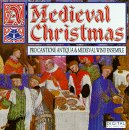| All Artists: Brown, Pro Cantione Antiqua Title: Medieval Christmas Members Wishing: 1 Total Copies: 0 Label: Innov. Music Prod. Release Date: 9/11/1993 Genres: Dance & Electronic, Special Interest, Pop, Classical Styles: Holiday & Wedding, Vocal Pop, Opera & Classical Vocal, Historical Periods, Early Music Number of Discs: 1 SwapaCD Credits: 1 Other Editions: Ther Is No Rose - Renaissance Music For The Christmas Season UPCs: 723721329525, 5010946684429 |
Search - Brown, Pro Cantione Antiqua :: Medieval Christmas
 | Brown, Pro Cantione Antiqua Medieval Christmas Genres: Dance & Electronic, Special Interest, Pop, Classical
|
Larger Image |
CD Details |
CD ReviewsDelicate jewels of Christmas music Bill Parker | Saint Paul, MN United States | 02/18/2004 (4 out of 5 stars) "The album title displays Middle English spelling and capitalization conventions, such as they were. It looks funny to us, but "ther" it is. "Ther is no Rose" is but one of 26 short vocal works on this album from the Renaissance period. Some of them celebrate Christmas, some meditate upon it; some are secular, some sacred; some are art music, some are folk songs; all are beautiful, and many have inspired later composers to write more elaborate versions. The simple originals on this album, however, have their own distinctive charm, and when performed simply and appropriately as here by the group Virelai (named after a French song form popular in the 14th and 15th centuries, usually having courtly love as its subject), they are delicate jewels of music.Virelai has five members: Catherine King, mezzo-soprano; Jacob Heringman, medieval plectrum lute, tenor and bass Renaissance lutes; William Lyons, Renaissance flutes and recorders; Susanna Pell, viols, lute and recorder; and Sarah Cunningham, viols and Renaissance harp. By the credits you see that authentic period instruments are employed. These are not souped-up versions of Christmas carols for modern symphonic ensembles, but chamber-scaled authentic editions designed to bring to life the sound-world of so long ago as scholars today think it may have been. Don't expect a file of valved trumpets to blare out "Joy to the World" or for a phalanx of blended strings to swoon into "Silent Night." This is the real Christmas music of a few hundred years ago, before electronic amplification, Technicolor, and Leopold Stokowski. This is not to say that nothing here will be familiar. Some of the melodies are heard regularly still, such as "Es ist ein Ros entsprungen" (usual English version, "Lo, how a rose e'er blooming") and "In dulci jubilo." A few others will be familiar to serious classical music lovers from being quoted in works of Bach, Honneger and others, such as "Wie schön leuchtet," Vom Himmel hoch," and Nun komm' der Heiden Heiland." These help one to get oriented; thereafter, the lesser known tunes can be absorbed as they are heard. Helping also are scholarly notes from Ms. Cunningham (see cast list above) explicating the source and circumstances of each selections. I was surprised to find Praetorius identified as a "Lutheren," but otherwise all was well."
|

 Track Listings (27) - Disc #1
Track Listings (27) - Disc #1